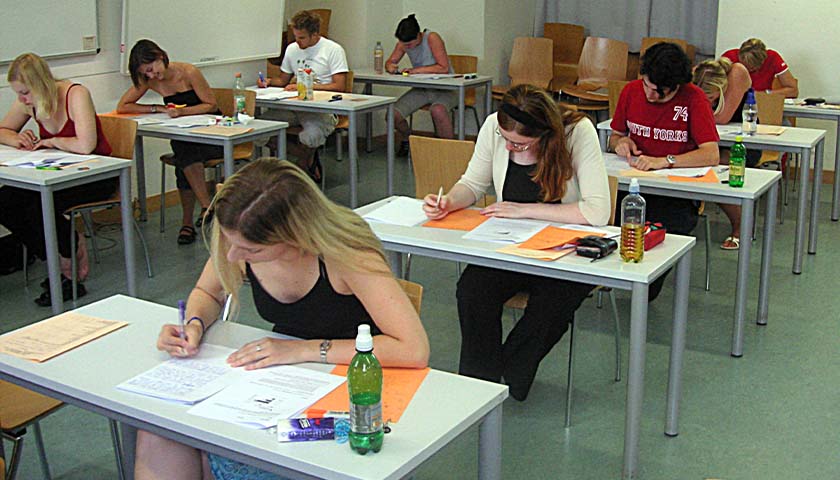Two popular school-choice programs for Pennsylvania students would get regular annual funding increases – expanding access to thousands of families – under legislation a state Senate committee approved yesterday.
Sen. Mike Regan’s (R-Dillsburg) bill would automatically raise allocations to the Educational Improvement Tax Credit (EITC) and the Opportunity Scholarship Tax Credit (OSTC) by 25 percent each year, provided at least 90 percent of obtainable scholarships have been utilized the year before. Regan estimated his funding rise would amount to $100 million more annually – about 0.3 percent of what the commonwealth spends on public education. His measure passed the Senate Education Committee by a party-line vote of seven to four and awaits a vote of the full chamber.
Scholarships generated by the EITC and OSTC, both of which bestow tax breaks on corporations that contribute to educational nonprofits, have been popular in the Keystone State, with significant demand still unmet. According to Regan, the state denied 43,000 students’ applications for EITC or OSTC credits – nearly half of requests received – after lawmakers passed a $25-million expansion in 2019. That increase did allow 8,000 more scholarships than had been available in the previous year.
“The fact of the matter is, there’re [40,000] to 50,000 students that are denied each year due to lack of funds,” Regan testified at yesterday’s committee meeting. “And they’re not just being denied a scholarship…, they are being denied the ability to seek an education at a school and in a setting that is best for them and their future. Some of these kids may never get the opportunity to lift themselves out of poverty or inevitable life of crime and prison because their taxpayer-funded public schools continue to fail to provide them with the education and support they need to break that horrible cycle.”
A former U.S. Marshal, Regan recalled a young drug offender he apprehended in Harrisburg years ago. In the course of the arrest, Regan spoke with the young man, who the senator recalled couldn’t have been much older than 20, asking how he came to engage in criminal activity.
The youth answered, “In Harrisburg, if you haven’t been to prison, you don’t have street cred.” He added that if a student desires a different path requiring scholastic achievement and applies himself accordingly, he risks physical backlash.
Regan said the arrestee’s reply provoked him to wonder what could solve a problem afflicting so many children and teens attending failing schools. He said another experience he had 15 years later suggested school choice was the answer. As the senator attended a presentation at Joshua Learning Center, a charter school in a dangerous, high-poverty neighborhood in the state capital, he heard a student discuss how the school improved his life.
“These are positive role models who are plucking these kids off the streets of these horrible neighborhoods and giving them a chance,” Regan said. “If you want to save the world, this is how you do it.”
In asking lawmakers from across the state to support more funding for a program that significantly aids families in the substandard School District of Philadelphia, Regan emphasized that his bill would help the EITC and OSTC to reach more students across Pennsylvania. He also stressed that higher-performing urban students will positively affect the entire state.
“I, like any member of this chamber, want to see these programs benefit my district as much as possible,” he said. “We cannot deny that what happens in Philadelphia impacts the rest of the commonwealth in one way or another and helping those kids will ultimately benefit the rest of the state. And Philadelphia is simply a large-scale version of what’s happening with areas within many of our own districts.”
The committee’s minority chair, Lindsey Williams (D-Pittsburgh) objected to the legislation on fiscal grounds, citing an estimate by the Pennsylvania School Boards Association that expanded EITC and OSTC programs will cost the commonwealth $2.6 billion over a decade.
“What state programs do you plan to cut to make up for this lost revenue, or do you plan to raise taxes?” Williams asked Regan.
He replied that the tax credits can be expected to generate savings to Pennsylvanians, for example by necessitating less economic assistance and less imprisonment. He cited data suggesting expanded EITC and OSCT programs would result in $7.4 billion in higher lifetime earnings resulting from better academic achievement.
“This shouldn’t be about money, it should be about saving people’s lives, but it’s about money for many of you; I understand that,” he said.
– – –
Bradley Vasoli is managing editor of The Pennsylvania Daily Star. Follow Brad on Twitter at @BVasoli. Email tips to [email protected].
Photo “Students Taking a Test” by KF.





